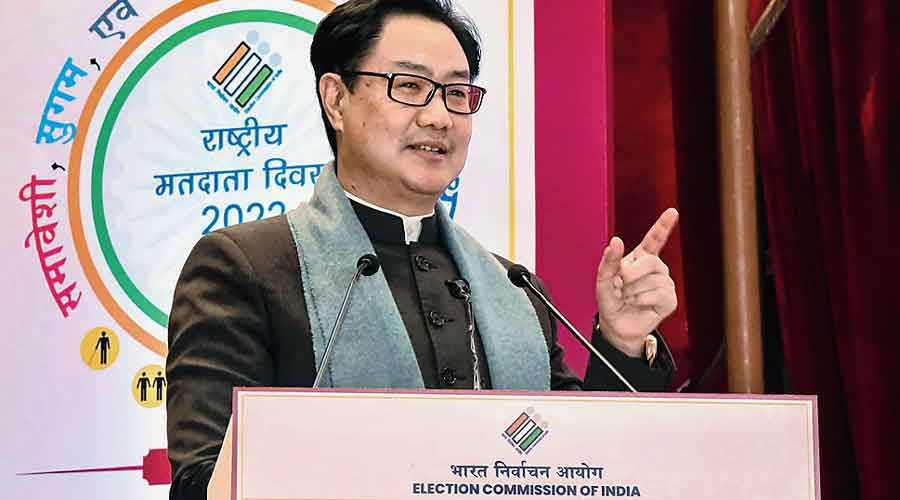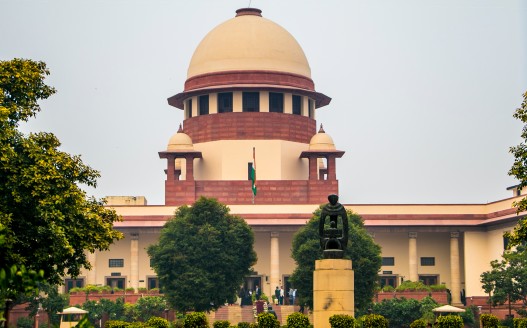The Supreme Court on Monday frowned on the comments by “someone high enough” in the government against the collegium system and suggested the Centre was “frustrating” the collegium’s recommendations on judges’ appointments out of resentment at the apex court’s 2015 judgment quashing the National Judicial Appointments Commission (NJAC).
A bench said the apex court would have to pass “judicial orders” if the government sought to “cross the Rubicon” by continuing to sit over recommendations on judicial appointments and transfers despite reiterations by the collegium, which the norms say is final.
Union law minister Kiren Rijiju, whom the court did not identify, had over the past fortnight repeatedly criticised the top court for quashing the NJAC.
The NJAC had sought to give the government a say in judicial appointments and transfers, now the sole preserve of the collegium. The minister had alleged opacity in collegium decisions and “intense politics” among its members.
“It appears that the government is not happy that the NJAC has not passed the muster. It appears, I would say, unhappiness of the government at the fact that the NJAC does not pass the muster. Can that be the reason not to clear the names?” Justice Sanjay Kishan Kaul told attorney-general R. Venkatramani and solicitor-general Tushar Mehta.
The bench of Justices Kaul and A.S. Oka was dealing with a petition moved by the Bangalore Advocates Association seeking contempt proceedings against the Centre for failing to clear several judicial appointments despite the collegium reiterating them.
Venkatramani and Mehta, the country’s top two law officers, had appeared before the bench in answer to a notice served to the Centre on the petition. At the hearing, Supreme Court Bar Association president Vikas Singh referred to Rijiju’s criticism of the collegium system.
“When someone high enough says that it (the NJAC judgment) should not have happened.... We have ignored all press reports, but this has come from somebody high enough who says, ‘Let them (collegium) do it (what they deem fit) themselves, we (government) will do it (what we think fit) ourselves --- it is crossing the Rubicon,” Justice Kaul, the second senior-most judge and a collegium member, told Venkatramani.
Under the norms, the Centre can seek reconsideration of a collegium recommendation but must clear it if reiterated, with the convention being to complete the entire process within four months of the initial recommendation.
Justice Kaul said some recommendations were “pending since one-and-a half years”.
“You cannot hold the names back without stating your reservations,” he said. “You are frustrating the method of appointment. Once the names have been reiterated, it is crossing the Rubicon by keeping names (pending) like this.”
Justice Kaul stressed the importance of adhering to the four-month timeline, underlining that vacancies in the higher judiciary had left “so many cases pending”.
He said the Centre sometimes ignores an earlier recommendation and clears a later one, thus disturbing seniority. “What happens is, when you don’t clear the names sent first, it completely disturbs the seniority.”
He stressed that the collegium makes its recommendations after an elaborate evaluation of various inputs obtained from the Intelligence Bureau, central government, the state high court collegium and members of the Supreme Court collegium itself.
The court told Venkatramani: “If today, (the) government says it will not adhere to the law of the land, then tomorrow someone will not adhere to another part. You must think of the larger picture, Mr Attorney.
“You must understand the anxiety. We expect the AG and the solicitor to ensure that the law of the land is followed. Convey this to the government.”











